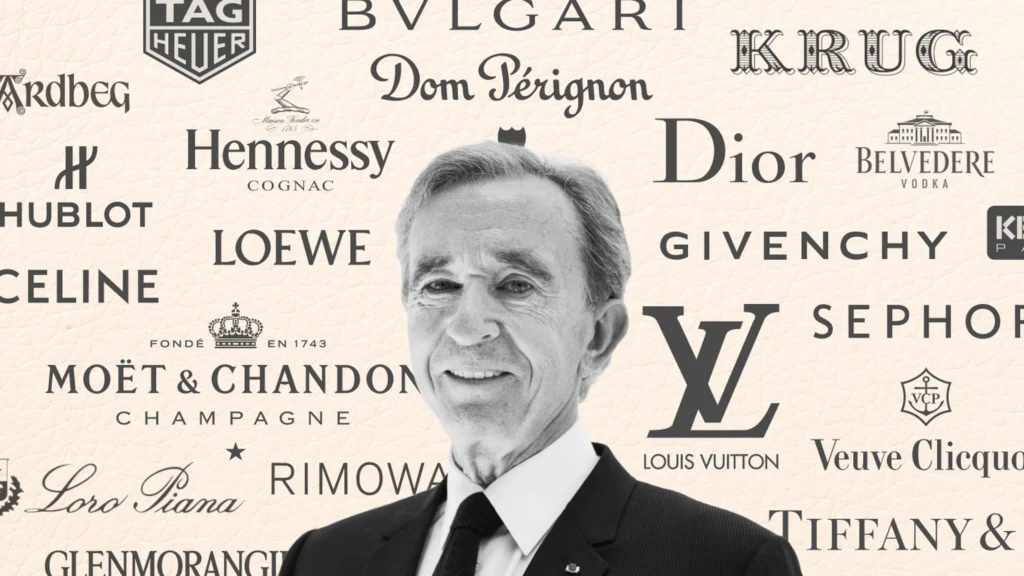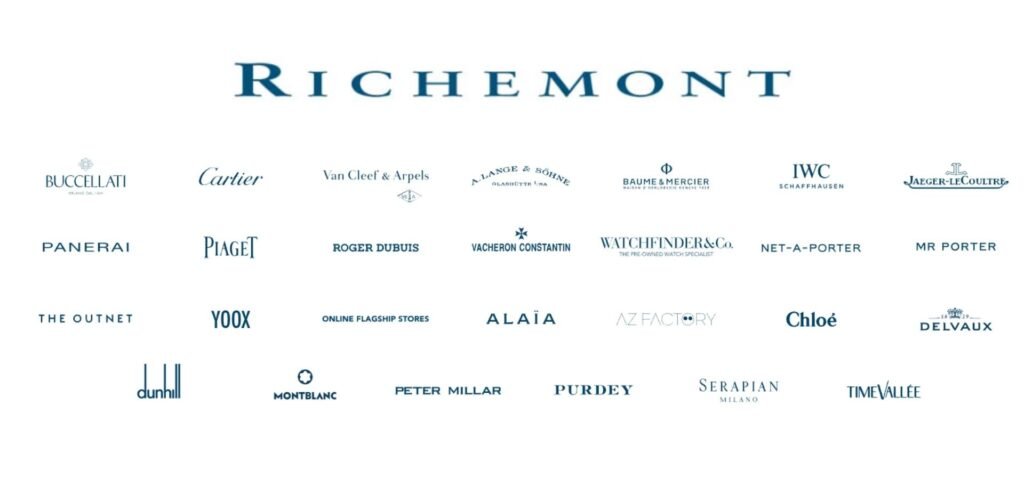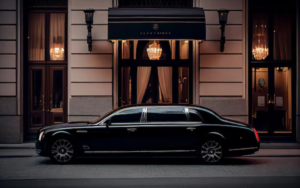Luxury goods have always captured the imagination of the world, representing aspiration, exclusivity, and timeless craftsmanship. At the heart of this industry are three behemoth conglomerates: LVMH, Richemont, and Kering. These giants dominate the global luxury market, driving trends and shaping consumer desires. This article delves into their storied histories, their current positions in the market, their iconic brands, and the challenges they face today.

LVMH: The Pinnacle of Luxury
LVMH Moët Hennessy Louis Vuitton, known as LVMH, was founded in 1987 through the merger of Moët Hennessy, a leading producer of champagne and cognac, and Louis Vuitton, the iconic French fashion house. Over the decades, the conglomerate has expanded aggressively under the leadership of Bernard Arnault, becoming the world’s largest luxury group. According to Forbes Arnault is the world 5th richest person in the world in 2024 with a net worth of 173.3 Billion USD.
Today, LVMH owns over 75 prestigious brands across fashion, cosmetics, jewelry, and spirits and is therefore the biggest luxury conglomerate. Its portfolio includes household names like Louis Vuitton, Dior, Fendi, and Givenchy in fashion; Bulgari and Tiffany & Co. in jewelry; and Dom Pérignon in wines and spirits. The group has consistently delivered record-breaking revenues, driven by its ability to combine heritage with innovation.
However, challenges persist. LVMH faces growing competition in key markets like China, where changing consumer habits and economic uncertainty have impacted luxury spending. Additionally, the company must balance its rapid expansion with sustainability goals, as consumers demand more transparency and ethical practices from brands. To ensure continuous growth Dior, as one of LVMHs strongest brands, has opened the Gold House in Bangkok. This concept store should is a strategic move by the maison to take advantage of the market potential in the Asia-pasific region especially in Thailand.

Richemont: Masters of Jewelry and Watches
Founded in 1988 by South African businessman Johann Rupert, Richemont has built its reputation as the king of fine jewelry and luxury watches. The luxury conglomerate emerged from the restructuring of Rupert’s family’s investments, focusing exclusively on luxury goods. Johan Rupert can not compete with Bernard Arnault in terms of net-worth as according to Forbes he „only“ has 11.5 Billion USD to his name.
Richemont’s portfolio is heavily skewed towards watches and jewelry, with standout brands like Cartier, Van Cleef & Arpels, and Piaget. In the watch segment, it owns prestigious names such as IWC, Jaeger-LeCoultre, and A. Lange & Söhne. The group also has a foothold in fashion through brands like Chloé and Alaïa and the E-Retailer Mr. Porter and Net-APorter
Despite its strong market position, Richemont faces challenges in appealing to younger consumers who are less likely to invest in traditional luxury watches. Especially in the fashion sector the luxury conglomerate faced a heavy challenge as they had to write down YNAPs assets worth 1,5 Billion Euros. This loss mostly resulted from the bad perfromance of Yoox, which is a E-Fashion retailer for luxury brands. Richemont managed to salvage the losses by selling Yoox Net-A-Porter to Mytheresa for 555 Million Euros. The deal will also give Richemont a 33% equity stake in Mytheresa, an e-commerce luxury business.

Kering: A Trailblazer with a Modern Approach
Kering, originally known as Pinault-Printemps-Redoute (PPR), began as a timber and building materials company in 1963, founded by François Pinault. The company shifted its focus to luxury goods in the late 1990s and rebranded as Kering in 2013, emphasizing its new identity as a luxury powerhouse. Kering’s portfolio includes some of the world’s most celebrated fashion houses, such as Gucci, Saint Laurent, Bottega Veneta, and Balenciaga.
While the group has enjoyed remarkable success with creative reinventions of these brands, Gucci—its largest revenue driver—has recently struggled with declining sales. In 2023, Kering announced a leadership change at Gucci to revive its appeal amidst increasing competition from rivals. As a direct effect Gucci´s revenue in 2024 as of now tanked by 25% compared to last year. This contributed to a overall sales drop of 16% across Kering. Its second-largest brand, Saint Lauren reported a 12% sales drop, while sales at the rest of the company’s brands including Balenciaga, McQueen and Boucheron also reported poor performance.
Additionally, Kering is grappling with broader industry challenges, including sustainability pressures and shifting consumer preferences. The group has made strides in its environmental commitments but faces scrutiny over how quickly these goals can be realized without compromising growth. The latest news concerning Kering is that Matthieu Blazy, the Artistic Director of Bottega Veneta will leave for Chanel beginning of next year.
The Future of Luxury
LVMH, Richemont, and Kering have all shown remarkable resilience in the face of industry upheavals. Yet, the future of luxury is being shaped by evolving consumer values, technological innovation, and geopolitical dynamics. These luxury conglomerates must navigate challenges like sustainability, economic volatility, and the growing importance of digital engagement to maintain their dominance.
While LVMH, Richemont, and Kering each have unique strengths and portfolios, they share a common challenge: staying relevant in a fast-changing world. Their ability to blend heritage with innovation will determine their continued success in the global luxury arena.




